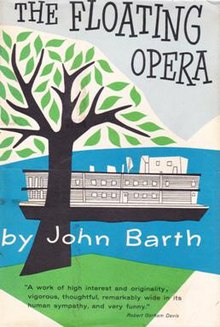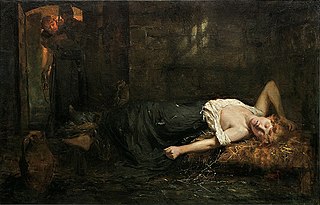
Nihilism is a philosophy, or family of views within philosophy, that rejects generally accepted or fundamental aspects of human existence, such as objective truth, knowledge, morality, values, or meaning. The term was popularized by Ivan Turgenev, and more specifically by his character Bazarov in the novel Fathers and Sons.
Magic realism or magical realism is a style of literary fiction and art. It paints a realistic view of the world while also adding magical elements, often blurring the lines between fantasy and reality. Magic realism often refers to literature in particular, with magical or supernatural phenomena presented in an otherwise real-world or mundane setting, commonly found in novels and dramatic performances. Despite including certain magic elements, it is generally considered to be a different genre from fantasy because magical realism uses a substantial amount of realistic detail and employs magical elements to make a point about reality, while fantasy stories are often separated from reality. Magical realism is often seen as an amalgamation of real and magical elements that produces a more inclusive writing form than either literary realism or fantasy.

Thomas Coraghessan Boyle, also known as T. C. Boyle and T. Coraghessan Boyle, is an American novelist and short story writer. Since the mid-1970s, he has published sixteen novels and more than 100 short stories. He won the PEN/Faulkner award in 1988, for his third novel, World's End, which recounts 300 years in upstate New York.
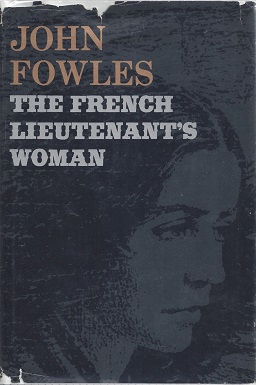
The French Lieutenant's Woman is a 1969 postmodern historical fiction novel by John Fowles. The plot explores the fraught relationship of gentleman and amateur naturalist Charles Smithson and Sarah Woodruff, the former governess and independent woman with whom he falls in love. The novel builds on Fowles' authority in Victorian literature, both following and critiquing many of the conventions of period novels.
Metafiction is a form of fiction which emphasises its own narrative structure in a way that continually reminds the audience that they are reading or viewing a fictional work. Metafiction is self-conscious about language, literary form, and story-telling, and works of metafiction directly or indirectly draw attention to their status as artifacts. Metafiction is frequently used as a form of parody or a tool to undermine literary conventions and explore the relationship between literature and reality, life, and art.

John Simmons Barth is an American writer who is best known for his postmodern and metafictional fiction. His most highly regarded and influential works were published in the 1960s, and include The Sot-Weed Factor, a satirical retelling of Maryland's colonial history, and Lost in the Funhouse, a self-referential and experimental collection of short stories. Though Barth's work has been controversial among critics and readers, he was co-recipient of the National Book Award in 1973 for his novel Chimera with John Williams for Augustus. Despite Barth's influence on postmodern literature in America, his influence and publicity have decreased since his novels were published.
Postmodern literature is a form of literature that is characterized by the use of metafiction, unreliable narration, self-reflexivity, intertextuality, and which often thematizes both historical and political issues. This style of experimental literature emerged strongly in the United States in the 1960s through the writings of authors such as Kurt Vonnegut, Thomas Pynchon, William Gaddis, Philip K. Dick, Kathy Acker, and John Barth. Postmodernists often challenge authorities, which has been seen as a symptom of the fact that this style of literature first emerged in the context of political tendencies in the 1960s. This inspiration is, among other things, seen through how postmodern literature is highly self-reflexive about the political issues it speaks to.

Giles Goat-Boy (1966) is the fourth novel by American writer John Barth. It is a metafictional comic novel in which the universe is portrayed as a university campus in an elaborate allegory of both the hero's journey and the Cold War. Its title character is a human boy raised as a goat, who comes to believe he is the Grand Tutor, the predicted Messiah. The book was a surprise bestseller for the previously obscure Barth, and in the 1960s had a cult status. It marks Barth's leap into American postmodern fabulism.

David Merrill Markson was an American novelist. He was the author of several postmodern novels, including Springer's Progress, Wittgenstein's Mistress, and Reader's Block. His final book, The Last Novel, published in 2007, was called "a real tour de force" by The New York Times.

In Greek mythology, the Shirt of Nessus, Tunic of Nessus, Nessus-robe, or Nessus' shirt was the poisoned shirt that killed Heracles. It was once a popular reference in literature. In folkloristics, it is considered an instance of the "poison dress" motif.
Historiographic metafiction is a term coined by Canadian literary theorist Linda Hutcheon in the late 1980s. It incorporates three domains: fiction, history, and theory.

Lost in the Funhouse (1968) is a short story collection by American author John Barth. The postmodern stories are extremely self-conscious and self-reflexive and are considered to exemplify metafiction.
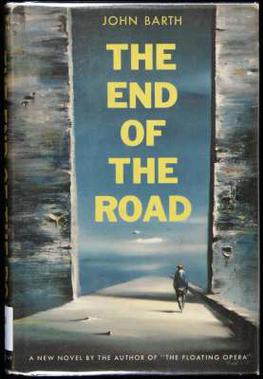
The End of the Road is the second novel by American writer John Barth, published first in 1958, and then in a revised edition in 1967. The irony-laden black comedy's protagonist Jacob Horner suffers from a nihilistic paralysis he calls "cosmopsis"—an inability to choose a course of action from all possibilities. As part of a schedule of unorthodox therapies, Horner's nameless Doctor has him take a teaching job at a local teachers' college. There Horner befriends the super-rational Joe Morgan and his wife Rennie. The trio become entangled in a love triangle, with tragic results. The story deals with issues controversial at the time, such as sexuality, racial segregation, and abortion.
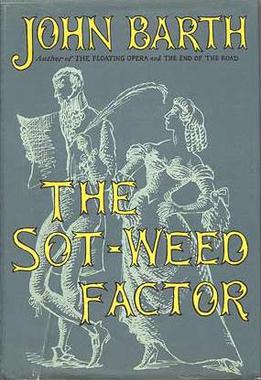
The Sot-Weed Factor is a 1960 novel by the American writer John Barth. The novel marks the beginning of Barth's literary postmodernism. The Sot-Weed Factor takes its title from the poem The Sot-Weed Factor: Or, a Voyage to Maryland. A Satyr (1708) by the English-born poet Ebenezer Cooke, about whom few biographical details are known.

Requiem for a Nun is a work of fiction written by William Faulkner. It is a sequel to Faulkner's early novel Sanctuary, which introduced the characters of Temple Drake, her friend Gowan Stevens, and Gowan's uncle Gavin Stevens. The events in Requiem are set in Faulkner's fictional Yoknapatawpha County and Jackson, Mississippi, in November 1937 and March 1938, eight years after the events of Sanctuary. In Requiem, Temple, now married with a child, must learn to deal with her violent, turbulent past as related in Sanctuary.
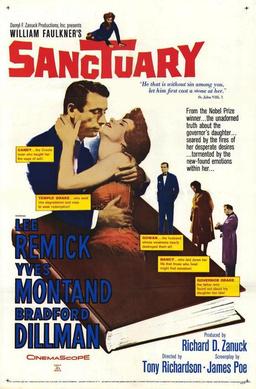
Sanctuary is a 1961 drama film directed by Tony Richardson. The film, based on the William Faulkner novels Sanctuary (1931) and Requiem for a Nun (1951), is about the black maid of a white woman who kills the latter's newborn in order to give her employer a way out of a predicament, and then faces the death penalty.

The Last Voyage of Somebody the Sailor is a novel by American writer John Barth, published in 1991. It is a postmodern metafictional story of a man who jumps overboard from a modern replica of a medieval Arab ship and is rescued by sailors from the world of Sinbad the Sailor. Eventually he makes his way to "Baghdad, the City of Peace", and finds himself in the stories of Sindbad and Scheherazade. The novel makes use of a challenging double-stranded narrative and a rich prose style.

Coming Soon!!! is a novel by American writer John Barth, published in 2001.

Quichotte is a 2019 novel by Salman Rushdie. It is his fourteenth novel, published on 29 August 2019 by Jonathan Cape in the United Kingdom and Penguin Books India in India. It was published in the United States on 3 September 2019 by Random House. Inspired by Miguel de Cervantes's classic novel Don Quixote, Quichotte is a metafiction that tells the story of an addled Indian-American man who travels across America in pursuit of a celebrity television host with whom he has become obsessed.
